
Guests
- Marc Lamont HillAfrican-American studies professor at Morehouse College, author of Nobody: Casualties of America’s War on the Vulnerable, from Ferguson to Flint and Beyond.
- Graham Weatherspoonretired detective with the New York City Police Department. He is also a board member of the Amadou Diallo Foundation.
On Thursday in Minnesota, thousands of people attended vigils for Philando Castile. A massive crowd gathered outside the Montessori school where Castile had worked. For the second day in a row, a crowd also gathered outside the governor’s mansion in St. Paul, where Castile’s girlfriend, Diamond “Lavish” Reynolds, addressed the crowd. Reynolds live-streamed the aftermath of her boyfriend’s shooting on Facebook, while she was still in the car, with a police officer pointing a gun at her and her young daughter. She narrated as her boyfriend lay dying next to her. Speaking outside the governor’s mansion, Reynolds said she live-streamed the aftermath of the fatal shooting “so the world would know these police are not here to protect and serve us. They are here to assassinate us. They are here to kill us, because we are black.”
Transcript
AMY GOODMAN: Thursday in Minnesota, thousands of people attended vigils for Philando Castile. A massive crowd gathered outside the Montessori school where he had worked. For the second day in a row, another crowd gathered outside the governor’s mansion in St. Paul, where Castile’s girlfriend, Diamond Lavish Reynolds, spoke out. She is the woman who live-streamed the aftermath of her boyfriend’s shooting while she was still in the car, with a police officer pointing a gun at her, her dying boyfriend and her four-year-old daughter in the back seat. She narrated as her boyfriend lay dying next to her. On Thursday, she spoke outside the governor’s mansion.
DIAMOND LAVISH REYNOLDS: I wanted everyone in the world to know that no matter how much the police tamper with evidence, how much they stick together, no matter how they manipulate, put it on Facebook and go viral, so that the people could see, so that the people could see. I wanted the people to determine who was right and who was wrong. I want the people to be the testimonies here. All of us saw with our eyes. Only thing you guys didn’t see is when he shot. And if I would have moved while that gun was out, he would have shot me, too.
SPECTATOR 1: Amen.
SPECTATOR 2: Man.
SPECTATOR 3: You’d have been right with him. You’d have been right there.
DIAMOND LAVISH REYNOLDS: So I chose to allow the video to go live 10 seconds before my phone died, because I wanted everybody in the world to see what the police do and how they roll. And it’s not right. It’s not acceptable. I didn’t do it for pity. I didn’t do it for fame. I did it so that the world knows that these police are not here to protect and serve us. They are here to assassinate us.
SPECTATOR 4: Yes, they are. Murderers.
DIAMOND LAVISH REYNOLDS: They are here to kill us, because we are black.
SPECTATOR 4: Murderers.
DIAMOND LAVISH REYNOLDS: We don’t support each other enough, so they feel like they can take us off the map. And it’s not OK. A good man, a 35-year-old man, worked for St. Paul public school, never been fingerprinted, never been handcuffed, he has been taken away from his community. This is detrimental to everybody that’s here today, not only me, myself and my daughter, but everyone in the world. I just ask that everyone continue to pray. I ask that we all get justice. Anybody who’s ever lost a loved one or someone close, dear to them, I feel for you guys, and I’m praying for each and every face I see out here tonight, because no one deserves—no one deserves this. I have not been able to sleep. I have not been able to eat. I have not been able to work. I have not been able to do anything besides hold my daughter, tell her I thank her, how much of a supershero she is, because she is an angel. She knew that he was gone before I knew, and she said, “Mom, the police are bad guys. They killed him, and he’s never coming back. He’s never coming back.” And the fact that my four-year-old had to tell me that he was gone, as I’m telling her never speak negatively until our earth, we only speak positive things. She knew that he was gone and he wasn’t coming back.
AMY GOODMAN: That’s Diamond Lavish Reynolds. She was the girlfriend of Philando Castile, talking about her four-year-old daughter who was in the back seat. And after her boyfriend died and she is told to step out of the car and walk backwards, as other police officers with—have their guns pointed at her, and she is handcuffed and put in the police car, and she’s asking, “What are you doing with my daughter?” And then she is put in the car next to her. As she weeps, realizing—this is Lavish—that her boyfriend is dead, what does her little daughter say, Marc?
MARC LAMONT HILL: Oh, my god. First of all, she comforts—I mean, she’s comforting her mother, saying it’s going to be OK.
GRAHAM WEATHERSPOON: Yeah.
AMY GOODMAN: “I’m here for you.”
MARC LAMONT HILL: “I’m here for you.” I mean, that’s incredibly powerful, and to watch what Diamond did, Lavish, you know, in terms of sort of handling the situation, the steadiness of her hand, her ability to calmly engage the officer, who’s still pointing a gun at her, to broadcast to the entire world what has happened.
AMY GOODMAN: And she doesn’t have her phone now.
MARC LAMONT HILL: Right.
AMY GOODMAN: But because she live-streamed, it was on Facebook.
MARC LAMONT HILL: Exactly, because if she doesn’t live-stream that, there is no reason to believe the police officers wouldn’t have destroyed that footage, because that is something that happens quite often. And just really quickly, she’s part of a long tradition of black women who have stood up against state violence. We often talk about male protesters and male resistance, but it’s women, from Emmett Till’s mother forward and backwards, who have always stood up, who have always held moral authority, who have always been courageous, who have always led us toward justice and freedom.
AMY GOODMAN: And when you looked at the image, Graham Weatherspoon, you’re a former cop, you’re a retired detective. The New York Times has a spread, four images, one the police officer with his gun pointed at Lavish and her daughter and her dying boyfriend in the car as she’s narrating her boyfriend’s death, and then the picture of her, the picture of him bloodied, laying out on the front seat, and the little girl in the back. Your thoughts as a police officer?
GRAHAM WEATHERSPOON: This is very disturbing to me. Why do people have to be subjugated to this kind of behavior? Why does a four-year-old child have to sit and watch a man who has cared for her summarily done away with like he was a roach? There were laws in North Carolina protecting slaves because they were chattel. Two white men who had killed a slave on their plantation were tried and sentenced to death for killing, butchering a slave in a barn in front of the other slaves in the 1850s. Their sentence was death for killing chattel. Animals in this country have more rights than black people. When we were chattel, we had some protection. We’re not seeing it here. You mentioned Emmett Till, and I was thinking of Emmett Till as we were listening to the gentleman from the NAACP. I did a video for We are Change about four years ago, three years ago, on videotaping the police and why people should. This is an example of why. The notion is that, you know, we’re not living in a Norman Rockwell experience where the policeman is sitting next to the boy on the stool and giving him an ice cream cone. Those days are long gone, unfortunately, for a lot of people. But there are some cops who will do the Norman Rockwell. But for a four-year-old child to be sitting in a car, to see a police officer firing shots into someone, for her to witness a murder like that? It’s not just the fact that this man is dead. It is the psychological damage that is being done to families and family members time and time and time again, and no one is looking at that.
I speak to mothers. There’s a 13-year-old boy in Brooklyn right now whose father was murdered by a police officer in Brooklyn 13 years ago, and that police officer has yet to face charges in the killing of Carlos Lopez. His son is suffering from depression, because his father died a couple of months before he was born. He doesn’t even know who his father was, and his father was not even committing a crime when he was murdered. But it was covered up by Charles Hynes and by the police department. But people are living, and they have to live with these—with these traumatic episodes, and it’s not even being—that’s not even being addressed. How do we—how do we, as a people, go forward, whether we’re black people, white people? How do we, as a nation, go forward, when we can see innocent people damaged? And it’s virtually a news clip for the week, until there’s another episode.
AMY GOODMAN: We’re going to come back to this conversation, as we break. You’re listening to, watching Graham Weatherspoon, who is a former police detective, also was a patrolman on the streets for many years. Also our guest, Marc Lamont Hill, who is the author of Nobody, that’s his brand new book, Casualties of America’s War on the Vulnerable, from Ferguson to Flint and Beyond. And joining us still from Baton Rouge, and he’ll stay with us for the hour, Mike McClanahan, president of the Baton Rouge NAACP. We’re also going to hear from people on the streets of New York; like people around the country, last night was a night of protest. It was also a night of horror in Dallas, as five police officers were gunned down, six severely injured, and we’ll get the latest on that, as well. Stay with us.
NEXT
Voices from the Streets: Thousands March in NYC Against Police Violence, 40 Arrested

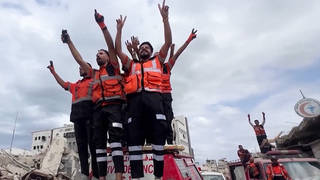
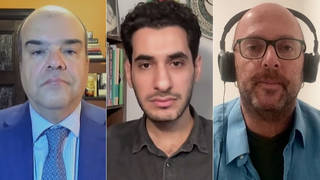
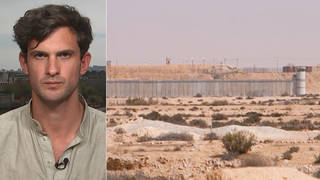
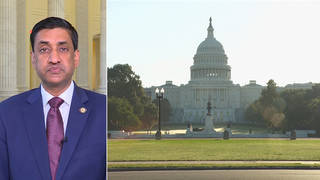





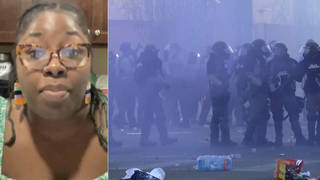

Media Options